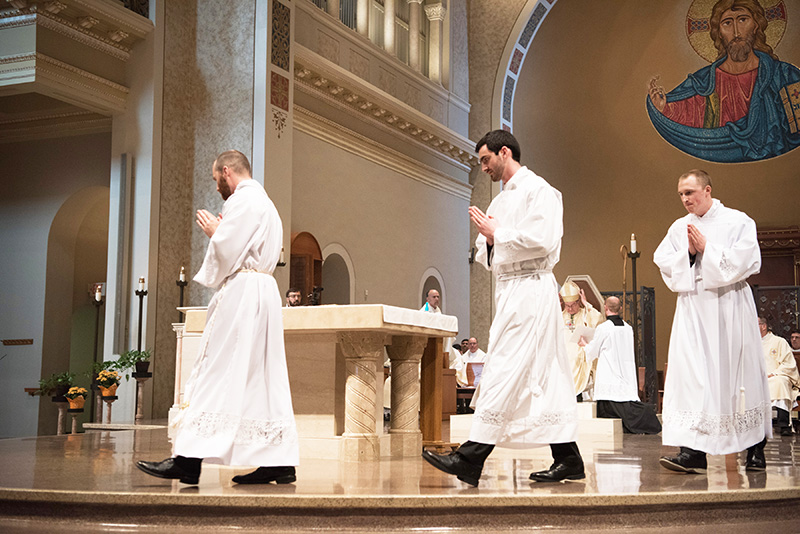
From left, Julian Druffner, Isaiah Schick and Dan Tracy were ordained to the transitional diaconate for the Diocese of Superior by Bishop James P. Powers on May 29 at the Cathedral of Christ the King, Superior. God willing, the three men will be ordained to the priesthood for the Diocese of Superior next summer. (Photo by Dan Swanson Photography)
Anita Draper
Catholic Herald staff
On Sunday, May 29, Bishop James P. Powers expressed his gratitude to all those who influenced and formed the three men he would be ordaining to the transitional deaconate.
The ordination Mass at the Cathedral of Christ King, Superior, marked the transition from the laity to the clergy for Daniel Tracy, Isaiah Schick and Julian Druffner, all of whom received their formation at Saint Francis de Sales Seminary in the Archdiocese of Milwaukee.
In his homily, after welcoming the candidates and their families, Bishop Powers thanked their parents for instilling the gift of faith and their willingness to share their sons with the faithful of the Diocese of Superior and beyond, and he observed that lack of family support steers many away from religious vocations.
Traditionally, ordination to the transitional diaconate marks the beginning of the final year of preparation for the diocesan priesthood, but Bishop Powers’ overarching message was to urge the three men not to fall into the easy trap of wanting to wish away the next year “and just jump right into priesthood.”
As natural as that yearning is, “I hope and I pray that you don’t fall into that trap,” he said. Being ordained to the diaconate does not mean you will be a deacon for just one year, he added.
“Every priest gathered here is still a deacon,” he reminded them. Despite that the men will be called “transitional” deacons, they will remain ordained in the Order of Deacons, the first of three degrees – priest and bishop are second and third, respectively – of the sacrament of Holy Orders.
“In order to be a good and holy priest, you first have to learn how to be a good and holy deacon. A deacon is to be that presence of Christ the servant in the world, and that connection to Christ the servant doesn’t end with our ordination to priesthood or as bishop – that’s why the church requires us to be ordained deacon first,” he explained.
“Again, we don’t graduate from one degree of orders when we assume another,” he added. “That sacramental effect of the three grades of orders culminates, rather, building on one another. When you become a priest, the diaconate dimension of your ministry has to be present.”
He reviewed deacons’ roles as ministers of the word, the altar and charity, and he emphasized the need to rely on God for help in fulfilling those duties.
Background
Druffner spent eight years with the Congregation of the Holy Cross, a community of missionary priests and brothers, and attended the University of Notre Dame in South Bend, Indiana, before discerning a call to the diocesan priesthood.
Schick, who grew up in Minnesota but worshipped often at his mother’s home church in the Diocese of Superior, graduated from the University of Steubenville in Steubenville, Ohio, before moving onto Saint Francis de Sales Seminary.
Tracy was a FOCUS (Fellowship of Catholic University Students) missionary in Minnesota for two years after earning his master’s degree in sport management; he spent the second year discerning God’s will for his future. The cathedral is his home parish.
God willing, all three men will be ordained to the priesthood for the Diocese of Superior next summer.
